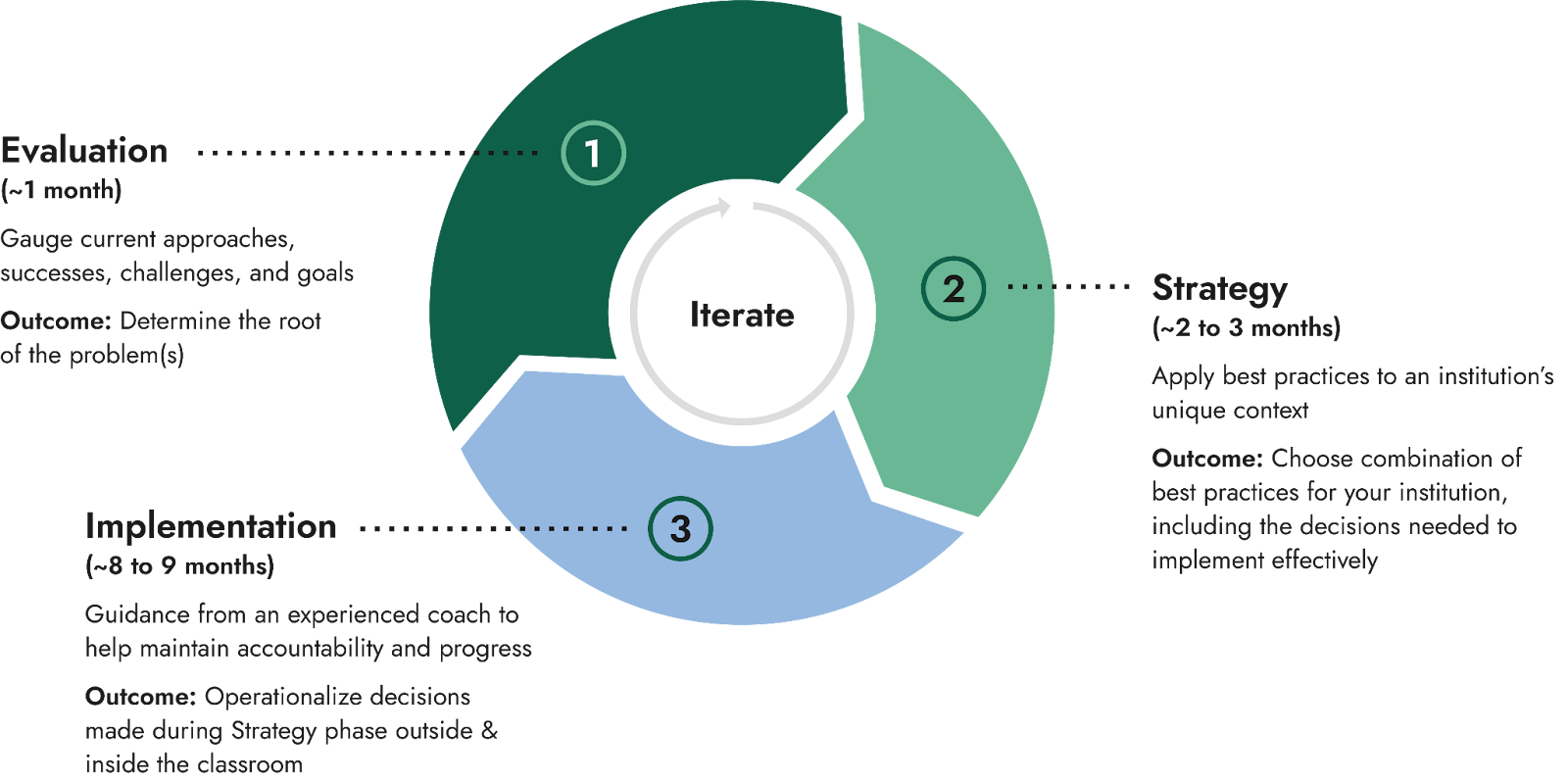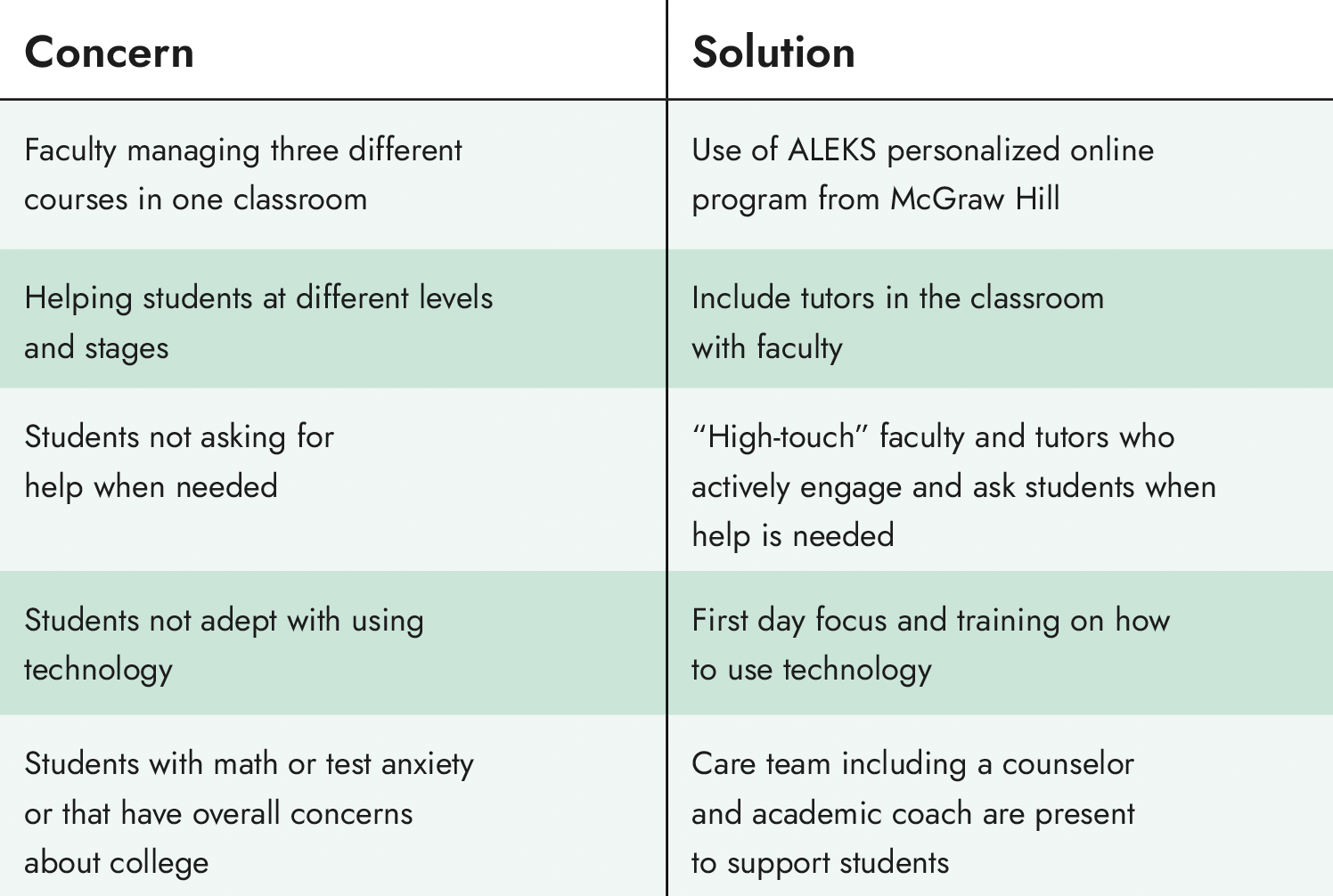
From Developmental Math to College Courses Outcomes of Waubonsee’s Summer Bridge Program
In response to the Developmental Education Reform Act, Waubonsee Community College, with the guidance of Almy Education and the ASPIRE program, designed and piloted a nine-day summer bridge program for students placed into developmental math. The pilot was a success, with 91% of the 48 enrolled students advancing at least one level in placement, and 71% enrolling in the subsequent fall semester.
The Situation
Waubonsee Community College needed to make changes to their developmental math program in response to the Developmental Education Reform Act (DERA) passed by Illinois in 2021. Like many other colleges in the Accelerating Student Progress and Increasing Racial Equity (ASPIRE) program sponsored by Women Employed, Waubonsee had a series of developmental math classes designed to teach students the math content and skills needed to engage with college-level math courses.
However, students were getting stuck in these courses and needed a way to advance out of developmental education. The idea of a summer bridge program was consistently mentioned when polling faculty and administration. Under the guidance and technical assistance of Almy Education, plus the connections and funding provided by the ASPIRE program, Waubonsee was able to design and implement a summer bridge program that worked for their unique student population.
The Redesign Process
Chassie Sherretz, Academic Support Manager at Waubonsee Community College, met and talked with Kathleen Almy at an ASPIRE conference by Women Employed. To begin the process, Kathleen shared articles and connected Waubonsee with other colleges who had previously implemented a summer bridge program. Concerns about implementing a summer bridge program raised by faculty and administration were alleviated through supportive meetings with Kathleen Almy.

“You want somebody who understands and who truly talks to administrators, like me, and to faculty... Kathleen is able to connect with everybody.”
Jessica Moreno, Dean for Academic Support
During the course of these meetings, Kathleen was able to address both faculty and administrative concerns with a variety of effective solutions.

Other benefits offered to students of the summer bridge program included a voucher to return to the college after completion, use of a cohort model to maintain student connections, and providing lots of food! Students were able to better concentrate on the math because their hunger was met with snacks for the classroom and to take home.
The Pilot Program and Results
In the spring of 2023, over 600 students were identified as needing developmental education, being placed into one of three classes. The college reached out to these students about the summer bridge program and ultimately had 48 enroll.
The first bridge program took place in late summer and lasted for nine days. Despite having a set amount of time, the goal of the program was to have students place one-level higher so students could register for the next course in their sequence.
“We’re trying to focus on having these students move up a level... it’s an overall collaborative college process that we have to go through.”
Chassie Sherretz, Academic Support Manager
Of the 48 students who enrolled in the summer bridge program, 45 completed the program and 91% moved up at least one level from their initial placement. A majority (71%) of students stayed at the college, enrolling in Fall 2023 courses.

From anecdotal and survey data, students reported that they gained confidence with math and technology and were more aware of the college’s resources and the support available from the care team. Faculty shared that it was a “great pilot” with “hardworking students.” They also were grateful for having tutors in the classroom.
“It was a win because students were refreshed in math, they got free food, and they got to make friends.”
Jessica Moreno, Dean for Academic Support
Continuous Improvement
A second bridge program was implemented in January 2024 with a few improvements:
- Limit to students who need to move on to College Algebra
- Reduce time from 9 to 7 days, focusing on goal of moving up one level
- Focus on math skills AND soft skills like collaboration and problem solving
- Minimum number of assignments required to move up a level
- Set roles and responsibilities for faculty, tutor, and care team members
- Create multiple assessments to aid in monitoring progress
Working with Almy Education
The success of Waubonsee Community College’s bridge program would not have happened without Kathleen Almy and Almy Education. From the initial conversation, Kathleen was able to provide resources and put Waubonsee in touch with other colleges who had gone through a similar process.
The regular ASPIRE meetings helped colleges to learn from one another. If one college was stuck, it was an issue to be shared with the entire group. Even in the absence of this support, Kathleen’s experience working with various institutions and her deep knowledge of the research puts her into a position to help schools of all types.
“Kathleen knows what to say and when to say it. She knows when to be a cheerleader, and she knows when to do a reality check. That is who you want in your corner.”
Chassie Sherretz, Academic Support Manager


Gateway Success Starts Here
Almy Education is the only gateway course consultancy that combines proven methodology with hands-on 'done with you' implementation support, led by current and former faculty who understand both systemic change management and classroom realities.



